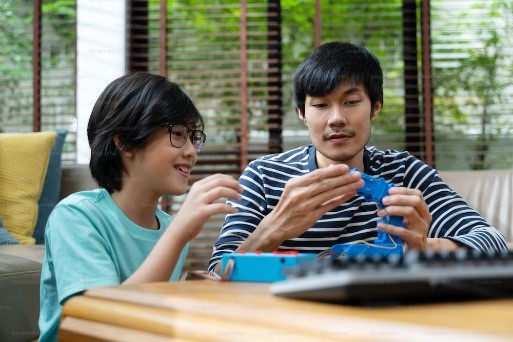I taught in state schools for twenty years before moving into the independent sector and am often asked for my views on state versus private schools. As a teacher, I had to be cautious about giving my opinion but, since leaving school teaching to establish my private tuition service, I can now be totally honest about my experiences of both sectors. In my opinion, independent schools offer three main advantages.
However, before you can even consider educating your children privately, there are two questions you must ask yourselves…

Can we afford it?
According to Moneyfarm, the average cost to parents of sending a child to independent schools between the ages of five and eighteen will be £526,000 – well over half a million pounds!
(Assuming 3% rise per annum in average fees)
Is our additional investment worthwhile?
Many parents see sending their children to independent schools as an investment in their future and there is no doubt pupils attending private schools benefit from significant advantages in later-life earnings. Green, Henseke and Vignoles, 2017


A school is only as good as its teachers.
I’m obviously biased but I believe a school is only as good as its teachers. Moreover, the Headteacher and Senior Managers have a profound impact upon staff cohesion, morale, and retention, which in turn influences pupils’ learning and educational wellbeing. In my experience, there is a range of extremely good, competent, and very weak teachers in both sectors.
I’ve worked with a great many dedicated and inspirational teachers in both state and independent schools. Unfortunately, good teachers in the state sector, who really care about their pupils, are prone to suffer from burnout as they strive to meet the impossible demands placed upon them. However, two of the least committed and most ineffective teachers I ever encountered were both working in an independent school – they would not have lasted 5 minutes in a state school!
Nevertheless, independent schools offer 3 main advantages:
Facilities at independent schools are usually far superior.
When I first started teaching in an independent school, I was amazed by the outstanding facilities for engineering, art, science, sports, drama and music – things that most state schools can only dream about. Children have opportunities to use these exceptional facilities from a very young age. They also start learning a second language from reception class – something that gives them a significant advantage in later years.

Extracurricular activities abound and children are encouraged to participate in all sorts of trips to places many state schools would not offer on the grounds most of their families could not afford them. Even the school lunches in private schools are amazing. On my first visit to an independent school dining hall, I was astonished to see, in addition to at least four choices of restaurant quality hot meals, there was a self-service salad bar overflowing with delicious foods such as Brie, hummus, olives, smoked salmon and prawns available to even the youngest children – and free for staff! State school offerings, made at a fraction of the price cannot possibly compete.

The beautiful surroundings, with spacious playing fields, myriad trees, wildlife areas and superb playground equipment at most independent schools also play a part in promoting well-being for both staff and pupils. Having said that, with a lot of effort and some money, parents of children in state schools can ensure their child has opportunities for learning a second language and engaging in extracurricular activities after school and at weekends. They can take their children on trips and into places of natural beauty, ignite their curiosity and encourage them to explore and develop an intrinsic love of learning during their leisure time.

Most parents of children in independent schools care about their children’s education.
(they wouldn’t be paying tens of thousands of pounds for it every year if they didn’t). Privately educated children know their parents want them to do well in school. This has a profound effect on the ethos of the classroom.

Obviously, it depends on the catchment area, but in the last state school I taught in, parental attitude could be broken down into about:
- 25% of parents who really cared about their children’s education, encouraged them to do their best and supported the school as much as they could;
- 50% of parents were fairly neutral with only occasional input or engagement with their children’s learning;
- 25% of parents were actively disparaging of teachers, schools and education in general.
These parents saw no value in education, rarely, if ever, supported school events, couldn’t care less what was being taught and thought nothing of swearing at or threatening teachers in front of their children. Unsurprisingly, children of parents like this were frequently disruptive, disengaged, and difficult to manage.

It is hard to work with children who are taught at home that things like stealing, fighting, and cheating are all acceptable things to do. Conversely, in independent schools, teachers and parents are more likely to have shared values – prizing things like honesty, integrity, sharing, good manners, sportsmanship, teamwork etc.
In many state schools it is expected there will be some children in every class who are disruptive and support for teachers managing very challenging behaviour on a daily basis is often lacking. However, in an independent school, SMT are quick to act, and parents will be involved from an early stage, with a clear expectation that parents will support the school’s disciplinary procedures and reinforce school rules at home. Parents know that if they refuse to support the school or their child continues to be disruptive, they will undoubtedly be asked to leave. In comparison, teachers in state schools are expected to work increasingly long hours and do everything possible to keep a disruptive child in school, even when their parents are being extremely unhelpful and hostile.
Parents of children in state schools can mitigate much of the above and show their children how important education is to them by volunteering for classroom support on a regular basis and/or activities to support the school, PTA and governors.
Private schools offer smaller class sizes in single year groups enabling more individual attention and less disruption.
This is particularly important for the quieter, less confident or more ‘average ability’ children who are easily overlooked in an overstretched state school class of 30+ children (often of mixed ages). This extra individual attention and support can of course be provided by parents at home. Alternatively, if parents can afford to pay for private tutors, they can be an invaluable resource for a fraction of the cost of independent schooling.

The way state school numbers are calculated means Headteachers often have no option to limit classes to single year groups. Successive governments have tried to convince parents and teachers that class sizes are irrelevant and mixed year groups are beneficial. Interestingly, I do not know of any independent school with class sizes over 25 (14 -20 is common) or mixed year groups from Year 3 onwards and it is these independent schools most MPs choose to send their own children to.
The choices we made for our own children
I have three (now adult) children, two of whom were educated solely in the state system, whilst one attended a specialist private school for 2 years (Y4-Y5) to get the specialist teaching she needed for her dyslexia. We had to remortgage our house to afford this – a decision I’ve never regretted as without this, I am certain our daughter would never have reached her potential.
We also paid for private tuition for one of our sons when he appeared to be losing interest in learning at school. This was invaluable – his tutor got to know him and chose activities to engage his interest while challenging him. This gave his confidence and self-esteem a terrific boost and re-ignited his curiosity and passion for learning.
We could not have afforded any additional private education for them. However, we did choose their state schools wisely and managed to secure places for all three of them at an excellent village college. We were always supportive of the schools, volunteering regularly both in the classroom and as a parent governor. All three of our children went on to university and now have successful careers. My little grandson is currently doing very well in a super state primary school – all of which proves a state education can be a very good option if parents are prepared to support the school.
Conclusion
Putting aside any moral concerns about education inequity, and taking the advantages listed above into account, if we could have afforded school fees when our children were younger, we would have sent them to carefully chosen, independent schools.
©Helen Jameson (2024)
References:
The Institute for Fiscal Studies (IFS): https://ifs.org.uk/publications/tax-private-school-fees-and-state-school-spending
The Times Newspaper: https://www.thetimes.co.uk/money-mentor/family/how-to-afford-private-school-fees#How-much-does-private-school-cost?

